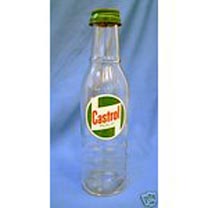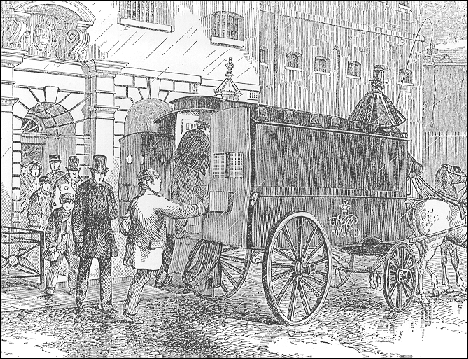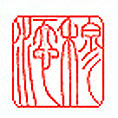But there was a regular customer who often came at about 2 am in a big American car, and who tipped well. My somewhat juvenile imagination put him down as a gangster with his moll, but he was an affable person.
 I had been taught a trick, when topping up oil (Castrol), which was, after serving, to upend the heavy glass bottle in which engine oil came in those days over an empty one, so that the small remainder would gradually drip down. That way, after serving a score or so customers, you had another full bottle, so that the price of the next top-up could go into your own pocket, rather than to your employer. So maybe I was a bit of a gangster myself. Or was it a good way of preventing unnecessary waste, in which no-one was a loser?
I had been taught a trick, when topping up oil (Castrol), which was, after serving, to upend the heavy glass bottle in which engine oil came in those days over an empty one, so that the small remainder would gradually drip down. That way, after serving a score or so customers, you had another full bottle, so that the price of the next top-up could go into your own pocket, rather than to your employer. So maybe I was a bit of a gangster myself. Or was it a good way of preventing unnecessary waste, in which no-one was a loser?

One night, at about 3 am, I think, there was a knock on my door. I put aside Plato’s comparison of the human condition to that of prisoners chained in a cave, and went out.
The person who knocked on my door points to where a man is lying in the road with his bicycle or moped lying some distance away. I go back to my hut, and dial 999 to report this fact.

 There is a tradition about a black woman called Maria Lee, who kept a sailors’ boarding house in Boston in the 1820s. She is said to have been a woman of such great size and strength that the unruly stood in dread of her, and when constables required help, it was a common thing to send for black Maria, who soon collared the refractory persons and led them to the lock-up. So a prison-van came to be called a ‘Black Maria’. In London, the Metropolitan police’s first vehicle of any kind was a Black Maria drawn by two dray horses, acquired in 1858.
There is a tradition about a black woman called Maria Lee, who kept a sailors’ boarding house in Boston in the 1820s. She is said to have been a woman of such great size and strength that the unruly stood in dread of her, and when constables required help, it was a common thing to send for black Maria, who soon collared the refractory persons and led them to the lock-up. So a prison-van came to be called a ‘Black Maria’. In London, the Metropolitan police’s first vehicle of any kind was a Black Maria drawn by two dray horses, acquired in 1858.
At all events, within a very short time after my emergency call, a Black Maria (appropriately coloured) screeched to a halt, and a dozen or more uniformed policemen surged out. Almost at once, an ambulance also arrived, and the paramedical personnel began to attend to their patient, telling him that he should go to hospital. He might have a kidney problem, they thought. But by then he had got up and was sitting on a low garden wall. A small crowd of onlookers had also gathered, despite the late hour. In a short while, the man got up, ignoring the police and the ambulancemen and the onlookers, picked up his bike, and wheeled it off along the road.
I went back to reading Plato. It was the first and only time I dialled 999, up to now, and I wondered at the fact that at my behest so many people had gathered so quickly to help someone, or just to look on, when it turned out (I hoped) to have been unnecessary.

